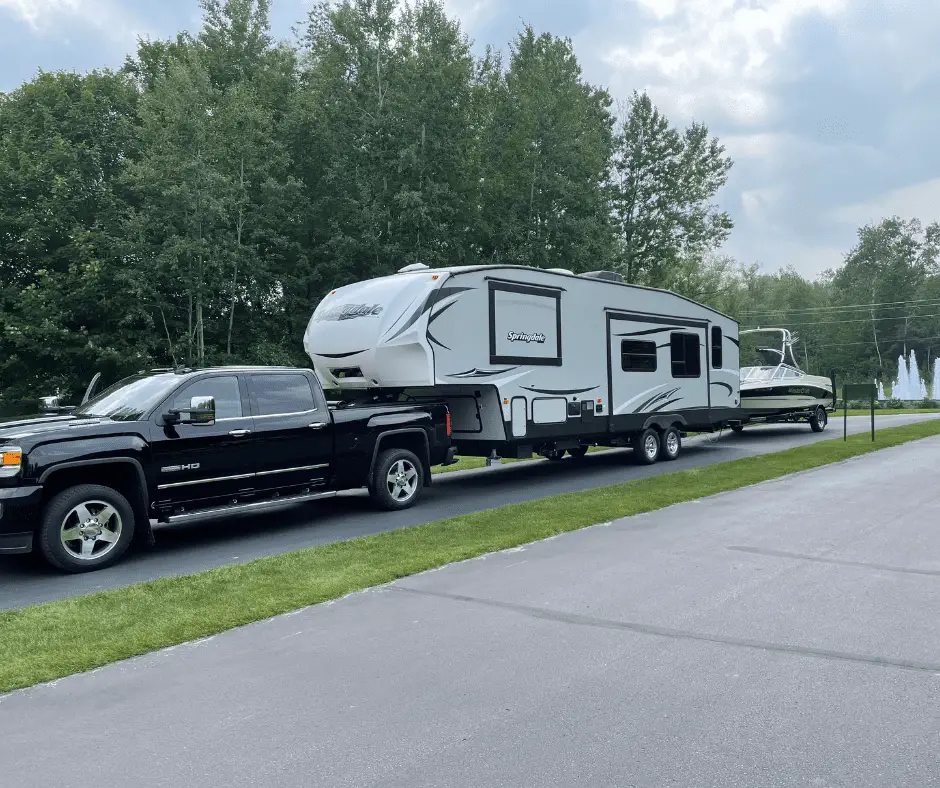Embarking on an adventure with your travel trailer and boat in tow is an exciting experience. But before you hit the road, it’s essential to ensure both your trailer and boat are in tip-top shape for a safe and enjoyable journey. This comprehensive checklist will guide you through the necessary steps to prepare your travel trailer and boat for the open road. Let’s dive in!
Travel Trailer Preparation
1. Inspect Your Tires
Check your travel trailer’s tire pressure, including the spare. Ensure they are inflated to the manufacturer’s recommended PSI. Inspect the tires for any signs of wear, damage, or aging. Replace tires if necessary.
Check out this article on: What Is The Best Travel Trailer Tire Pressure?
2. Check the Wheel Bearings and Brakes
Inspect your wheel bearings and brakes for signs of wear or damage. Grease the bearings if necessary, and if you’re unsure about their condition, consider having them professionally checked.
3. Test All Lights and Electrical Components
Ensure all exterior lights, including brake lights, turn signals, and clearance lights, are functioning correctly. Test your electric brake controller and 12-volt battery system as well.
4. Secure All Doors, Windows, and Vents
Double-check that all doors, windows, and vents are closed and locked. Apply sealant to any gaps or cracks in the seals to prevent water leaks.
5. Check the Propane System
Inspect your propane system for leaks and make sure all appliances are in working order. Ensure the propane tanks are secure and filled.
Boat Preparation
1. Inspect Your Boat’s Hull
Check your boat’s hull for any damage, cracks, or leaks. Make any necessary repairs before hitting the road.
2. Verify the Boat’s Weight
Ensure your boat’s weight, including gear and fuel, does not exceed your trailer’s capacity.
3. Secure the Boat to the Trailer
Use high-quality straps to secure your boat to the trailer. Check that the bow eye is attached to the winch and the boat is properly positioned on the trailer.
4. Prepare the Engine and Fuel System
Check the engine oil, coolant, and fuel levels. Inspect the fuel system for leaks or damage. If your boat has a marine battery, ensure it’s charged and properly secured.
5. Stow and Secure All Gear
Store and secure all gear, such as life jackets, paddles, and fishing equipment, inside the boat to prevent damage during transit.
General Towing Tips
- Practice your driving skills, especially backing up and maneuvering with the trailer and boat attached.
- Ensure you have a valid trailer registration and insurance.
- Familiarize yourself with state and local towing laws to avoid any surprises along the way.
You might enjoy this article: Can You Pull A Boat Behind A Travel Trailer? (State Laws)
Additional Travel Trailer Preparation Tips
6. Inspect the Hitch and Coupler
Examine your hitch and coupler for signs of wear, rust, or damage. Make sure they are correctly adjusted and secure. Keep the hitch ball lubricated to minimize friction.
7. Check the Suspension System
Inspect your trailer’s suspension system, including the springs, shackles, and bushings, for wear or damage. Replace any worn or damaged components as needed.
8. Test the Safety Chains and Breakaway Cable
Ensure the safety chains and breakaway cable are in good condition and properly attached. Replace any worn or damaged components.
9. Verify the Awning
Check your travel trailer’s awning for any rips, tears, or other damage. Make sure it’s properly secured and stowed for travel.
10. Inspect the Interior
Go through the interior of your travel trailer, ensuring all cabinets, drawers, and appliances are secure. Check for any loose items that could shift or become projectiles during travel.
Additional Boat Preparation Tips
1. Inspect the Bilge Pump and Drain Plug
Check your boat’s bilge pump to ensure it’s functioning correctly. Confirm the drain plug is in place and secure.
2. Check Navigation and Safety Equipment
Ensure your boat’s navigation lights are operational and that you have all required safety equipment on board, such as life jackets, fire extinguishers, and a first aid kit.
3. Verify Your Boat’s Registration and Documentation
Ensure your boat’s registration and documentation are up-to-date and on board. Familiarize yourself with any boating regulations specific to your destination.
4. Inspect the Steering and Throttle Systems
Check your boat’s steering and throttle systems for proper function and any signs of wear or damage. Make any necessary repairs before hitting the road.
5. Secure the Bimini Top and Canvas Covers
If your boat has a Bimini top or canvas covers, ensure they are securely stowed and fastened to prevent damage during transit.
By following these additional steps, you’ll be even more prepared for your journey, ensuring a smooth and enjoyable experience on both land and water. Safe travels!
More Travel Trailer Preparation Tips
1. Check the Water and Waste Systems
Inspect your travel trailer’s freshwater, gray water, and black water systems. Check for leaks, ensure the tanks are empty or at the proper levels, and verify the valves are in the correct positions for travel.
2. Inspect Roof and Seams
Examine your travel trailer’s roof for damage, cracks, or leaks. Apply sealant to any gaps or cracks in the seams to prevent water intrusion.
3. Test the Air Conditioning and Heating Systems
Ensure your travel trailer’s air conditioning and heating systems are working properly. Clean or replace air filters as needed.
4. Charge and Test the Batteries
Check your travel trailer’s batteries, ensuring they are fully charged and in good condition. Test all 12-volt systems, such as lights and fans, to ensure they are operational.
5. Inspect the Stabilizer Jacks
Examine your travel trailer’s stabilizer jacks for any signs of damage or wear. Make sure they are properly retracted and secure for travel.
6. Check the Smoke, Carbon Monoxide, and LP Gas Detectors
Test your travel trailer’s smoke, carbon monoxide, and LP gas detectors to ensure they are functioning correctly. Replace batteries if necessary.
7. Verify Your Travel Trailer’s Weight
Ensure your travel trailer’s weight, including cargo and fluids, does not exceed your tow vehicle’s capacity.
8. Confirm Your Breakaway System
Inspect your travel trailer’s breakaway system, which engages the trailer brakes in the event of an accidental disconnect. Ensure it is functioning correctly and in good condition.
9. Inspect the Weather Stripping
Examine your travel trailer’s weather stripping around doors and windows for damage or wear. Replace if necessary to maintain a proper seal.
10. Double-Check Your Toolkit
Ensure your travel trailer toolkit contains essential tools and spare parts, such as a lug wrench, tire pressure gauge, fuses, and light bulbs.
More Boat Preparation Tips
1. Inspect the Propeller and Lower Unit
Examine your boat’s propeller and lower unit for any signs of damage or wear. Make any necessary repairs before hitting the road.
2. Check the Fuel and Ventilation Systems
Inspect your boat’s fuel lines, connections, and tanks for leaks or damage. Ensure the fuel system is properly ventilated.
3. Test the VHF Radio and Electronics
Ensure your boat’s VHF radio and other electronic devices, such as GPS and fish finders, are in working order.
4. Inspect the Anchor and Rode
Check your boat’s anchor and rode for signs of wear or damage. Ensure they are properly stowed and secure.
5. Check the Fenders and Dock Lines
Inspect your boat’s fenders and dock lines for wear or damage. Replace any worn or damaged components as needed.
6. Verify the Trailer Lights and Wiring
Ensure your boat trailer’s lights and wiring are in good working order. Check for any frayed or damaged wiring and replace as needed.
7. Inspect the Trailer’s Bunks and Rollers
Examine your boat trailer’s bunks and rollers for any signs of wear or damage. Replace or adjust as needed to ensure proper boat support.
8. Test the Trailer’s Tongue Jack and Wheel Chocks
Ensure your boat trailer’s tongue jack is functioning correctly and in good condition. Verify that you have wheel chocks for added safety when parked.
9. Inspect Your Boat’s Covers and Tie-Downs
Examine your boat’s covers, tie-downs,
and straps for any signs of wear or damage. Replace any worn or damaged components as needed to ensure your boat remains protected and secure during transit.
10. Prepare Your Emergency Kit
Make sure your boat’s emergency kit is up-to-date and includes items such as flares, a whistle, a flashlight, extra batteries, and a waterproof container for your cell phone.
By following these additional preparation tips for both your travel trailer and boat, you’ll ensure a safe, enjoyable, and hassle-free adventure. Proper preparation not only increases the longevity of your equipment but also contributes to a more enjoyable experience for everyone involved.
Good luck and happy camping!
Check out our article on: Can You Pull A Boat Behind A Travel Trailer? (State Laws)

